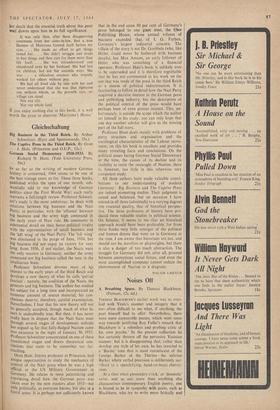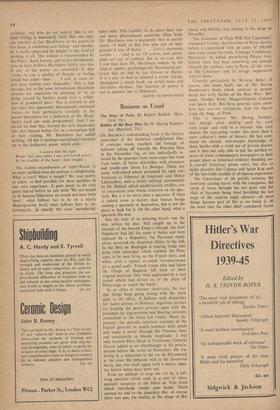Noises Off
A Breathing Space. By Thomas Blackburn. (Putnam, 12s. 6d.)
THOMAS BLACKBURN'S earlier work was SO over- laid with Yeats's manner and imagery that it was often difficult to see what, if anything, the poet himself had to offer. Nevertheless, there were some memorable poems, which went some way, towards justifying Roy Fuller's remark that Blackburn is 'a relentless and probing critic of his own psyche.' In the present collection he has certainly thrown off the pervasive Yeatsian manner: but it is disappointing that, rather than develop any style of his own, he has reverted to a `Bardic' tone that is most reminiscent of the George Barker of the Thirties—the inferior Barker where verbal precision is deliberately sac- rificed to a speechifying, hand-on-heart rhetori- cism.
At a time when gimmickry ('sick,' or 'domestic' verse, and so on) more than anything else characterises contemporary English poetry, one is bound to be in sympathy with poets, such as Blackburn, who try to write more lyrically and seriously, and who do not believe that to ex- hibit feeling is necessarily fatal. But one must ask whether in fact Blackburn, in the poems in this book, is exhibiting real feeling—and whether he is really subjecting his psyche to any kind of probing at all. This volume is recommended by the Poetry Book Society, and in his introductory note in their Bulletin Blackburn rightly says that if any of the poems are successful—if they 'evoke in you a quality of thought or feeling which has value—then . . . I will, to some ex- tent have written your biography.' This is true enough; but in the same introduction Blackburn arouses our suspicions by speaking of `us' as being 'chased by faceless giants over a wilder- ness of powdered glass.' One is entitled to ask just what this apparently idiosyncratic statement means—to look particularly carefully in the poems themselves for a definition of Mr. Black- burn's (and our own) predicament. And I am afraid we find that, beyond the now lucubrated idea that human beings live in a mysterious hell of their making, Mr. Blackburn has added nothing. All this is (perhaps unwittingly) summed up in the dedicatory poem, which ends: . . . I cannot find the right Words: bat, love, enter, I say, and hatred scorch In the crucible of the heart: distil insight.
The violent enjambement of 'right/Words' is no more justified than the passage is enlightening. What is love? What is insight? We read poetry to know, to find parallels for these qualities in our own experience. A poet needs to be very good indeed before he can write 'We are meant to be human/Otherwise we would not have been born': what follows has to be on a nearly Shakespearian level; what follows here is, un- fortunately, in exactly the same meandering,
noisy vein. This inability to do more than rant and shout platitudinous questions often leads Mr. Blackburn into a pomposity that is merely comic-1 think of that Jew who saw on holy ground/A tree of flame,". . . Love's enormous verities . .' and so on. Of course, such quota- tions are out of context, but in no case that I can find does Mr. Blackburn redeem by the kind of sudden, psychologically illuminating pre- cision that we find in, say, Graves or Hardy. It is a pity to find so talented a writer relying, throughout a whole book, on verbal noise and derivative rhythms. The function of poetry is not to impress, but to illuminate:
MARTIN SEYMOUR-SMITH

























 Previous page
Previous page